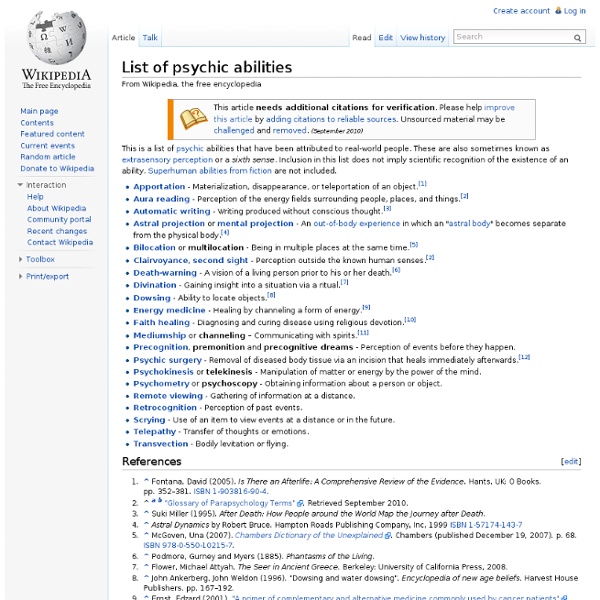



Remote viewing Remote viewing (RV) is the practice of seeking impressions about a distant or unseen target, purportedly "sensing" with the mind.[1] Remote viewing experiments have historically been criticized for lack of proper controls and repeatability. There is no scientific evidence that remote viewing exists, and the topic of remote viewing is generally regarded as pseudoscience.[2][3][4][5][6][7] Typically a remote viewer is expected to give information about an object, event, person or location that is hidden from physical view and separated at some distance.[8] Physicists Russell Targ and Harold Puthoff, parapsychology researchers at Stanford Research Institute (SRI), are generally credited with coining the term "remote viewing" to distinguish it from the closely related concept of clairvoyance,[9][10] although according to Targ, the term was first suggested by Ingo Swann in December 1971 during an experiment at the American Society for Psychical Research in New York City.[11] History[edit] C.
Cognitive science Cognitive science is the interdisciplinary scientific study of the mind and its processes.[1] It examines what cognition is, what it does and how it works. It includes research on intelligence and behavior, especially focusing on how information is represented, processed, and transformed (in faculties such as perception, language, memory, reasoning, and emotion) within nervous systems (human or other animal) and machines (e.g. computers). Cognitive science consists of multiple research disciplines, including psychology, artificial intelligence, philosophy, neuroscience, linguistics, and anthropology.[2] It spans many levels of analysis, from low-level learning and decision mechanisms to high-level logic and planning; from neural circuitry to modular brain organization. The fundamental concept of cognitive science is "that thinking can best be understood in terms of representational structures in the mind and computational procedures that operate on those structures. Principles[edit]
How to Color Inked Line Art in Photoshop In this Photoshop tutorial, I’m going give you a general overview of how I digitally color an illustration. We’ll go over scanning, cleaning, flatting, coloring, rendering, and texturing techniques. There’s just as many ways to coloring a drawing digitally as there is to painting a picture. Preview Click the image below to see it in full size. Step 1: Scanning Your Inks In this tutorial, I’m going to use my own illustration. Make sure you are scanning in black and white. Step 2: Isolating the Line Art Now that we have our image scanned, open it in Adobe Photoshop. Press Ctrl/Cmd + Alt/Option + 2 (for Photoshop CS4 and up) or Ctrl/Cmd + Alt/Option + ~ (for Photoshop CS3 and below). Tip: I encourage you to know and use Photoshop shortcut keys; it saves a lot of time. Then press Delete to remove the selected white areas, leaving us with just the line art on this layer. Create a new layer (Shift + Ctrl/Cmd + N). Step 3: Clean Up Inks Step 4: Flats Step 5: Coloring Step 6: Rendering Step 7: Textures
DailyHoroscope - best horoscope application for your smartphone © Comitic™ all rights reserved Your Glorified Ignorance Wasn't Cool Then, And Your Scientific Illiteracy Isn't Cool Now NASA/JPL-Caltech, for the Cassini mission All across the country, you can see how the seeds of it develop from a very young age. When children raise their hands in class because they know the answer, their classmates hurl the familiar insults of "nerd," "geek," "dork," or "know-it-all" at them. The highest-achieving students — the gifted kids, the ones who get straight As, or the ones placed into advanced classes — are often ostracized, bullied, beat up, or worse. The social lessons we learn early on are very simple: if you want to be part of the cool crowd, you can't appear too exceptional. But ignorance isn't normal at all. Magdalena Kowalska / CERN / ISOLDE team There are so many remarkable things that we — as a species — have figured out about existence. Our most valuable explorations of the world and Universe around us have been scientific ones: where we learn about reality by asking it the right questions about itself, and listen to the answers that it reveals. Kristin High / U.S.
Outline of parapsychology - Wikipedia Parapsychology is a field of research that studies a number of ostensible paranormal phenomena, including telepathy, precognition, clairvoyance, psychokinesis, near-death experiences, reincarnation, and apparitional experiences. Essence of parapsychology[edit] General concepts[edit] Organizations[edit] Parapsychologists[edit] Publications[edit] See also[edit] External links[edit] Parapsychology FAQ Frequently asked questions, by the Parapsychological Association, one of the major groups studying parapsychological phenomena.FindArticles.com Index Large number of articles about parapsychology, from publications such as the Journal of Parapsychology and the Skeptical Inquirer.Committee for Skeptical Inquiry Organization formed in 1976 to encourage the critical investigation of paranormal claims and parapsychology.
Decrypting text Encrypted text is sometimes achieved by replacing one letter by another. To start deciphering the encryption it is useful to get a frequency count of all the letters. The most frequent letter may represent the most common letter in English E followed by T, A, O and I whereas the least frequent are Q, Z and X. Common percentages in standard English are: and ranked in order: Common pairs are consonants TH and vowels EA. If the results show that E followed by T are the most common letters then the ciphertext may be a transposition cipher rather than a substitution. The box below contains example ciphertext.
30+ Free Watercolor Brush Sets Resources May 27, 2010 Numerous brushes are constantly being released online, even as I type. These brushes vary from abstract, to fiery, to smudgy, and to much, much more. Here at You the Designer, we too have showcased several unique and useful brushes for designers of all levels. In this next post, we have another set of cool brushes you can download for free. 30+ Free Watercolor Brush Sets are showcased below for your perusal. Grab your mouse and get ready to download your chosen brushes. Author: Ronald Bien Ronald is the founder of NaldzGraphics.net. my drawing of angelina jolie Anomalies: the Strange & Unexplained | Keeping the Paranormal Real